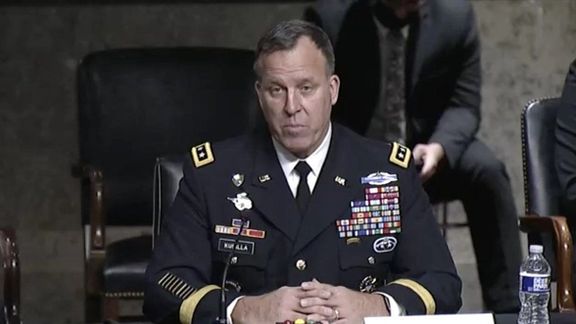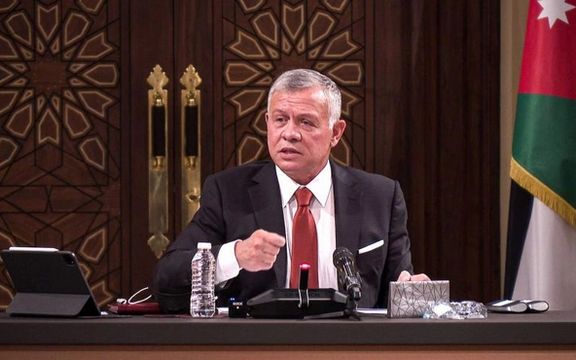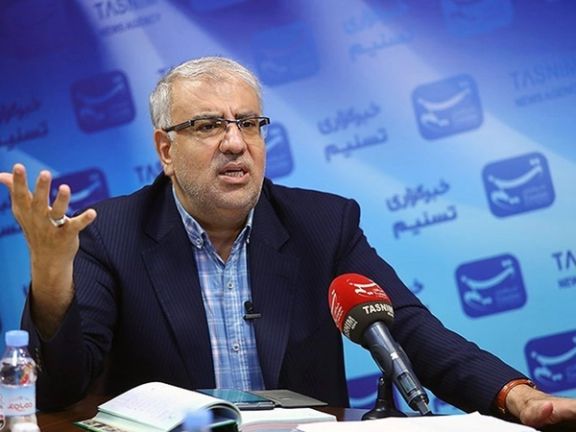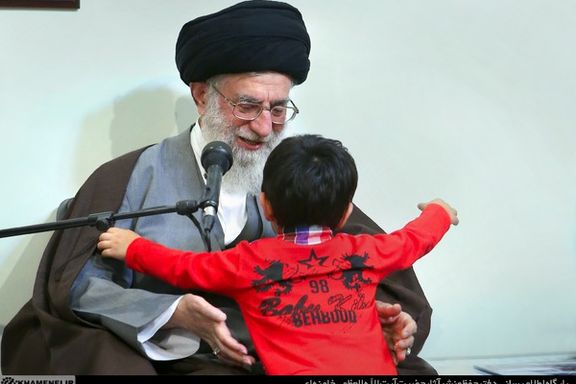CENTCOM Commander Calls For Coordinated Effort To Confront Iran

The new United States military commander in the Middle East has told an Abu Dhabi newspaper that Iran is the most destabilizing force in the Middle East.

The new United States military commander in the Middle East has told an Abu Dhabi newspaper that Iran is the most destabilizing force in the Middle East.
Kurilla travelled to Egypt, the United Arab Emirates and Saudi Arabia less than 45 days after taking the command to hear from America’s strategic partners, he said. The US relationships with the UAE and Saudi Arabia have been strained, while Egypt faces food shortages with 85 percent of its wheat imported from Russia or Ukraine.
Kurilla said that Iran’s uranium enrichment, ballistic missile development, and regional alliances, particularly with Ansar Allah, or the Houthis, in Yemen, had repeatedly been central to his conversations.
“The United States' position is that we will not allow Iran to have a nuclear weapon, however, our concerns about Iran go far beyond their nuclear capability and ambitions,” he said.
Referring to Ansar Allah attacks on Saudi Arabia and the UAE since 2021 – following the Saudi military intervention in Yemen in 2015 – Kurilla said he sought an “integrated air and missile defense program in support of the kingdom [Saudi Arabia] and the Emirates.” His predecessor General Kenneth F McKenzie said during his farewell visit that Iran was the region’s “principal bad actor.”

Jordan’s King Abdullah has expressed concerns about Iran and its proxies filling a vacuum left by Russians in southern Syria, warning that this could lead to issues along the borders.
He made the remarks during an interview on Wednesday at the Hoover Institution at Stanford University in the United States.
In response to a question about how to approach the issues created by Iran across the region, Jordan's ruler said that "we want everybody to be part of a new Middle East and to move forward, but we do have security challenges. We're seeing border attacks on a regular basis and we know who's behind that".
He described Russia's presence in southern Syria as a "source of calm because they were making sure that we could deconflict” but as Russia is reportedly removing troops to focus on Ukraine, “that vacuum will be filled by the Iranians and their proxies, so unfortunately, we're looking at maybe an escalation of problems on our borders".
"Do the politics, the negotiations that are going on between Saudia Arabia, the [Persian] Gulf countries, the United States, does that move Iran into a more positive light? I hope so. I'm not seeing it on the ground at the moment," King Abdullah added.
According to a report by the Moscow Times, an independent Dutch-based paper, Iran forces and Lebanese group Hezbollah have taken over several Russian military bases in Syria.
Iran Diplomacy, a website close to the Iranian Foreign Ministry, says Russian forces' withdrawal from Syria, and the possibility of Iranian forces replacing them could be an indication that Moscow is trying to keep Iran in its camp.

Some Iranians complain that their Instagram posts are being restricted, allegedly by other Iranians working for the company's content review subcontractor.
In recent days some Iranian activists and groups have complained about restriction on public access to their direct messages as well as removal of hashtags, videos, and posts related to ongoing protests in the country.
‘1500 Tasvir’ which runs popular Instagram and Twitter accounts dedicated to Iranian politics and protests said on Twitter Tuesday that it can no longer access videos sent to their Instagram account by citizen reporters in Iran.
In January Instagram also removed posts with the hashtag #IWillLightACandleToo which many used to commemorate 176 victims who died when Iran’s Revolutionary Guard in January 2020 fired two missiles at a Ukrainian passenger plane near Tehran. Instagram later apologized and said the hashtag had been “restricted by mistake.”
Instagram also explained that the restriction was due to the hashtag being “reported” by other users for not meeting Instagram community guidelines.
In April 2019, Instagram also deleted accounts of many current and previous Iranian Revolutionary Guards (IRGC) commanders after the US designated the IRGC a ‘foreign terrorist organization.’
BBC’s sources alleged that pro-regime employees of the German branch of Telus International, a Canadian contractor which provides content moderation to Instagram, are responsible for restricting anti-government content of Iranian users.
One the sources told the BBC that pro-regime employees would first report certain hashtags, posts and accounts for violation of Instagram rules during their breaks when they could use their personal mobile phones and then remove the post or account based on their own anonymous reports.
The source currently working for Telus, who the BBC report introduced with the alias Mehdi, said the company had over 400 Iranian employees for reviewing Persian-language content.
In response to BBC Persian’s enquiry, Meta – the mother company of Facebook, Instagram, and WhatsApp – said decisions of its 15,000 staff who review content in 70 languages , including Persian, were also reviewed to establish their fairness. Meta also said it had not found any evidence of restriction of a hashtag related to recent protests in Iran’s Hafshajan.
Iran's Supreme Leader Ali Khamenei who is ultimately responsible for all human rights violations in the country has multiple accounts on Instagram and the company has not acted to take them down despite many appeals aby activists.
Instagram which has around 45 million users in Iran is the only major social media platform not blocked in the country where other platforms such as Facebook, YouTube, WhatsApp, Twitter, and Telegram cannot be accessed without the use of anti-filtering software and VPNs.
Iran’s Supreme Leader Ali Khamenei who often refers to pro-regime cyber propagandists as “soldiers” in a soft war, has repeatedly criticized slow progress in launching a regulated national internet network.
The National Information Network (NIN) to be established under the Fifth Development Plan Act, is a system of control over internet access and content, blocking websites and social-media platforms deemed religiously or politically unacceptable
Iran has one of the world’s worse internet censorships, with tens of thousands of websites blocked since the early 2000s and most social media platforms banned. In the absence of free media and the very high level of censorship, many Iranians turn to social media for political news and information.

While Iranians are protesting rising prices and the government talks about cost savings, a group of over 40 officials are set to travel to Switzerland for a two-week online conference.
The group is mainly comprised of officials from the Ministry of Cooperative, Labor and Social Welfare, including Minister Hojatollah Abdolmaleki himself, as well several members of parliament, local media reported.
The 110th Session of the International Labour Conference is scheduled to be held in Geneva from May 27 to June 11, which means the government is willing to spend hundreds of thousands of euros airfare and accommodation for the delegation apart from their per diems for an event that can be attended online.
Several cities across Iran are a scene of protests that began in the southwestern province of Khuzestan over a week ago triggered by a sudden jump in food prices, and have spread to other provinces.
The protests have quickly taken an anti-government tone and protesters often chant slogans against authorities, including the supreme leader, the president, and the ruling clerics. In some instances, protesters have attacked local headquarters of the Basij militia of the Revolutionary Guards (IRGC) whose members are often deployed to suppress protesters.
In larger cities such as the capital Tehran, Mashhad, Zanjan and Shiraz security forces have displayed a heavy presence on the streets, creating an atmosphere of fear and apprehension.

Iran’s oil minister Javad Owji told reporters Wednesday it would take Russia time to find new markets to replace possible losses in exports to Europe or north America.
Before the Ukraine invasion, Russia sold about half of its 7.85 million barrels a day (bpd) of exported crude and refined oil to Europe, but discussions with the European Union (EU) of a ban on Russian oil – following bans introduced by Australia, Canada, the United Kingdom, and the United States – had led to speculation that Russia would look for new markets in Asia, where China and India continue to buy Russian crude offered at discount.
According to a recent report in the Wall Street Journal, Iran’s oil exports, going mainly to China, rose to 870,000 bpd in the first three months of 2020, up around 30 percent from an average 668,000 bpd in full-year 2021.
This prompted questions to Owji from reporters as to whether Russia might displace Iran, especially by undercutting on price – to which the minister offered reassurance.
While the Group of Seven (G7) nations, including Japan, have agreed to phase out Russian oil imports, the EU has been unable to follow suit, mainly due to opposition from member states dependent on Russian supplies, such as Hungary. Eurostat figures show Russian earnings from oil exports to Europe at a higher level in 2022 than in 2021.

Iran’s Supreme Leader Ali Khamenei says efforts to increase the country's population are among the most urgent duties and essential policies of the Islamic Republic.
In a message to the National Population Taskforce on Wednesday, Khamenei appreciated efforts of officials active in the field of population growth as well as the government and lawmakers in parliament.
He warned about “dangers of an aging population” and called for measures to boost birth rates.
“This is a vital policy for the long-term future of our dear country” Khamenei said, claiming that scientific research has proven all the possible harms of this policy can be avoided. He also urged more legal and cultural efforts aimed at increasing the population.
Khamenei’s remarks came as tens of millions of Iranians have sunk into poverty in the last decade because of an inefficient economy, low growth and foreign sanctions. The government raised basic food prices earlier this month, adding to existing inflation.
Parliament has passed legislation to outlaw tubectomy, vasectomy, and the free dispensation of contraceptives other than where pregnancy would threaten a woman's health. The health ministry has advised women over 35 to wait only a year before becoming pregnant again and under-35s to wait six months.
Medical experts have warned that the new legislation would increase sexually transmitted diseases by restricting access to condoms.
The law obliges the government to offer incentives, including a 7.5-fold increase in child-benefit payments to government employees, interest-free loans, and other benefits. While the new law does not include a ban on prenatal screening, doctors have been advised not to encourage it.